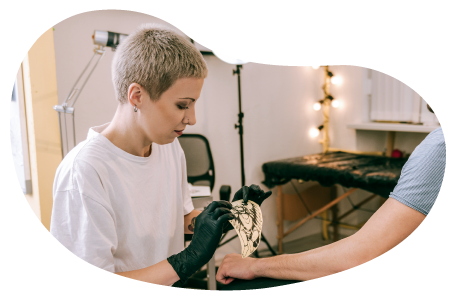
Why do tattoo shops need insurance?
Tattoo artists face a wide range of risks, from allergic reactions and infections to copyright infringement claims. Business insurance covers costly accidents and lawsuits, giving you the peace of mind to focus on your art. State laws, commercial landlords, and franchising contracts may require coverage.

Find the right coverage
Insureon helps tattoo artists find insurance policies that match their unique needs.
Get free expert advice and peace of mind knowing you have the right insurance for your tattoo shop.
What types of insurance do tattoo artists need?
These policies cover common risks for tattooing and piercing businesses.
General liability insurance
A general liability policy covers basic third-party risks, such as a client who slips on a wet floor at your tattoo shop. Bundle it with commercial property insurance for savings in a BOP.
- Slip-and-fall accidents
- Damaged client property
- Libel and slander lawsuits
Business owner’s policy
A BOP bundles general liability insurance and commercial property coverage under one plan. It's one of the most cost-effective types of commercial insurance for tattoo parlors.
- Client personal injuries
- Damage to your building or its contents
- Business interruption incidents
Professional liability insurance
Professional liability coverage pays for legal costs related to professional negligence, such as a misspelling or failure to use a sterile needle. It's also called malpractice insurance.
- Errors, such as misspelling a name
- Tattoos that are blurry or misaligned
- Infections from a contaminated needle
Workers’ compensation insurance
Most states require workers' compensation for tattoo shops that have employees. It also protects sole proprietors from work injury costs that health insurance might deny.
- Employee medical expenses
- Disability benefits
- Employee injury lawsuits
Cyber insurance
Cyber insurance covers costs related to data breaches and cyberattacks. It's strongly recommended for tattoo shops that handle credit card numbers and other personal information.
- Data breach notification costs
- Fraud monitoring services
- Cyber incident investigations
Commercial auto insurance
Commercial auto insurance covers the cost of accidents involving a vehicle owned by a tattoo shop. Most states require this coverage for vehicles owned by a business.
- Property damage caused by your vehicle
- Legal costs from auto accidents
- Vehicle theft and vandalism
How much does tattoo shop insurance cost?

A tattoo artist who works independently will pay less for insurance than a larger business.
Factors that affect tattoo artist and shop insurance premiums include:
- Types of body art and tattoo services offered
- Business property and equipment
- Annual business income
- Location
- Types of insurance purchased
- Policy limits and deductibles
- Other coverages, such as an additional insured endorsement for a guest artist
How do I get tattoo business insurance?
It's easy to get tattoo shop insurance if you have your business information on hand. Our application will ask for basic facts about your shop, such as revenue and number of employees. You can buy a policy online and get a certificate of insurance with Insureon in three easy steps:
- Complete a free online application.
- Compare insurance quotes and choose a policy.
- Pay for your policy and download a certificate.
Insureon's licensed agents work with top-rated U.S. insurance companies to find the right coverage for your business, whether you’re a tattoo shop owner or you work as a mobile tattoo artist.
Verified business insurance reviews
Hear from customers like you who purchased small business insurance.
FAQs about business insurance for tattoo parlors
Get answers to frequently asked questions about tattoo artist insurance and body piercing insurance.
Do tattoo artists need a license or certification?
There are no federal mandates for tattoo artists, but each state has its own regulations. These regulations can vary widely.
In most cases, you'll need the following to get licensed or certified as a tattoo artist:
- Bloodborne pathogens certification: State licensing agencies and local health departments usually require tattoo artists, piercers, and permanent makeup artists to take a course on bloodborne pathogens in order to prevent communicable diseases.
- Hepatitis B vaccination: Most states will require you to submit proof of vaccination against Hepatitis B or an exemption form, due to the risks inherent to your work.
- Coursework or an apprenticeship: You'll often need to have sufficient body art experience or education in order to register as a tattoo artist or get licensed.
In Florida, you only need to complete an educational course that takes a few hours and pay a licensing fee to become a tattooist. On the other hand, Oregon requires extensive education and experience as a tattoo artist, in addition to training in both CPR and bloodborne pathogens, first aid, and the successful passing of an exam.
You'll also need to fill out an application form, pay a fee, and periodically renew your license.
What are the regulations for tattoo shops?
Every tattoo shop must comply with the Occupational Safety and Health Administration (OSHA) Bloodborne Pathogens Standard, which regulates sharps disposal and personal protective equipment (PPE), such as gloves and goggles for employees.
Keep in mind that there may be additional requirements in your state or city for certain types of businesses, such as:
- Decorative tattoos
- Paramedical tattoos
- Piercings
- Tooth jewels
- Scar camouflage
- Permanent makeup / microblading
- Gauging
- Dermal anchors
- Henna tattoos
- Tattoo removal
For example, in some states you might need to be a licensed dental professional in order to apply tooth gems, but it's often unregulated. It's worth researching your local laws to make sure you're in compliance for everything your shop offers.
Do I need business insurance for my tattoo studio if I am self-employed?
It's always a good idea to carry insurance for a tattoo shop, even if you're a sole proprietor or an independent contractor. Here are the reasons why you still need coverage:
- You face the same risks as a bigger business. A customer could still fall and suffer an injury in your shop, or have an allergic reaction to tattoo ink, regardless of your business's size or number of employees.
- Your landlord might require liability insurance. Many commercial leases require tenants to carry general liability insurance to protect against costly customer lawsuits.
- Your work has a high risk of bodily injury. Working with needles increases the risk of injury to your customers and yourself. It's important to carry general liability insurance and product liability insurance for financial protection against customer injuries, and workers' compensation insurance to protect yourself against costly medical bills.
- Your personal and business assets are not separate. When you're self-employed, a lawsuit can devastate both your business and personal finances (unless you form a limited liability company or LLC). That makes insurance coverage doubly important.
- A botched tattoo could end up costing a fortune. If a customer sues over a mistake in a tattoo or accuses you of substandard work, you could face an expensive lawsuit. That's why even sole proprietors should carry professional liability insurance.
Will coverage apply for tattoo artists who provide services at a convention?
Yes, if you work a booth at a tattoo convention you will be covered by your liability insurance—provided there is not an exclusion on your policy. Some expos and conventions will require you to have insurance.
However, commercial property insurance only covers items at your primary business location. You'll need to purchase tools and equipment insurance, a type of inland marine insurance, to protect your tattoo guns and other equipment while they are at the convention or in transit.
What other kinds of insurance do you need as a tattoo artist?
For a comprehensive risk management strategy, tattoo artists should consider the following types of additional coverage:
- Business interruption insurance: Also called business income insurance, this add-on to your property insurance covers temporary closures from a fire or storm.
- Commercial property insurance: Property insurance covers your tattoo or piercing shop and everything in it. It'll pay for broken windows, stolen equipment, fires, and water damage.
- Business personal property (BPP) coverage: This policy covers your tattoo pens, tattoo needles, and other business equipment. It's included in commercial property insurance, or you can add it as an endorsement to your general liability policy if you don't need coverage for a building.
- Commercial umbrella insurance: Umbrella insurance boosts the coverage on your general liability, commercial auto, and employer's liability insurance once the policy reaches its limit.
- Product liability insurance: This type of insurance covers harm caused by a tattoo or other product, such as an allergic reaction to ink. It's typically included with general liability insurance.
